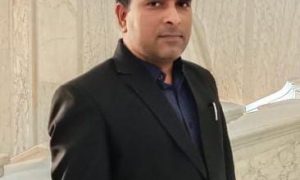This Interview has been published by Pragya Chandni and The SuperLawyer Team

Could you share a bit about your journey into the legal profession and what inspired you to specialize in Arbitration, White Collar Crimes, Company, and Insolvency Laws?
My journey into the legal profession was deeply influenced by my upbringing in a family that valued justice and integrity as I have seen my grandfather perform his duties as a High Court Judge. As a first-generation lawyer, I was inspired by the power of law to effect positive change in society. My interest in arbitration, white-collar crimes, company law, and insolvency laws stemmed from a desire to navigate complex legal landscapes and provide strategic solutions to clients. These areas not only challenge me intellectually but also allow me to contribute meaningfully to corporate governance, dispute resolution, and ensuring compliance with regulatory frameworks.
With over 9 years of experience, you’ve handled a diverse range of cases from representing individuals against gambling regulations to corporate disputes worth billions. How do you navigate such varied legal landscapes?
Indeed, my experience has been diverse, spanning from advocating for individuals facing regulatory challenges in areas like gambling to handling high-stakes corporate disputes worth billions. To navigate such varied legal landscapes, I rely on a combination of thorough research, collaboration with experts in specialized fields, and a deep understanding of legal principles. Each case presents unique complexities, but by staying adaptable, keeping abreast of legal developments, and leveraging my interdisciplinary skills, I’m able to provide effective representation tailored to the specific needs of my clients, regardless of the legal terrain
You’ve had significant experience in representing companies before various courts and tribunals. What are some key strategies you employ when handling high-stakes cases, particularly those involving complex contractual disputes or insolvency matters?
When handling high-stakes cases, especially in corporate matters, several key strategies come into play. Firstly, thorough preparation is paramount. This includes comprehensive case analysis, anticipating potential challenges, and developing robust legal arguments. Secondly, effective communication with clients is essential to ensure alignment on goals and expectations. Thirdly, strategic negotiation and alternative dispute resolution methods are often explored to mitigate risks and achieve favorable outcomes outside of court. Additionally, building strong relationships with opposing counsel and maintaining professionalism in all interactions can help in navigating complex legal proceedings. Ultimately, my approach revolves around a combination of meticulous preparation, strategic thinking, and proactive communication to safeguard the interests of my clients in high-stakes scenarios.
Given your extensive experience in drafting legal documents and notices, could you walk us through your process for ensuring accuracy and effectiveness in such critical tasks?
Drafting legal documents and notices requires meticulous attention to detail and a keen understanding of the relevant legal principles. My process begins with a thorough review of the relevant laws, regulations, and case precedents to ensure accuracy and compliance. I then work closely with my clients to understand their specific needs and objectives, tailoring the language and content of the documents accordingly. Throughout the drafting process, I employ rigorous quality control measures, including multiple rounds of review and peer feedback, to catch any errors or inconsistencies. Additionally, I prioritize clarity and precision in language to ensure that the documents effectively convey the intended message and stand up to scrutiny in legal proceedings. By combining legal expertise with a methodical approach to drafting, I strive to deliver documents that are not only legally sound but also strategically crafted to achieve the desired outcomes for my clients.
In your experience, what are some common challenges or misconceptions clients face when dealing with arbitration proceedings, especially in complex commercial disputes?
In my experience, clients often face several challenges and misconceptions when dealing with arbitration proceedings, particularly in complex commercial disputes. One common challenge is understanding the intricacies of the arbitration process itself, including the selection of arbitrators, procedural rules, and the enforceability of awards. Additionally, clients may underestimate the time and cost involved in arbitration compared to traditional litigation. Misconceptions about the finality of arbitration awards and the ability to appeal decisions also arise frequently. Furthermore, navigating multi-jurisdictional issues and enforcing awards across borders can pose significant challenges in international arbitration cases. To address these challenges, I prioritize proactive communication and education, ensuring that my clients have a thorough understanding of the arbitration process and its implications. By providing strategic guidance and advocating for their interests effectively, I help clients navigate arbitration proceedings with confidence and achieve favorable outcomes in even the most complex disputes.
Your expertise extends to navigating the intricacies of criminal law, including cases involving white-collar crimes. How do you approach defending clients in such cases, balancing legal strategies with maintaining their reputation and integrity?
When defending clients in cases involving white-collar crimes, I approach each situation with a dual focus on legal strategy and reputation management. Firstly, I conduct a comprehensive analysis of the legal aspects of the case, examining evidence, statutes, and precedents to formulate a robust defense strategy. This may involve challenging the prosecution’s evidence, negotiating plea deals, or presenting compelling arguments in court.
Simultaneously, I prioritize protecting my client’s reputation and integrity. This involves proactive communication with stakeholders, including the media, investors, and the public, to ensure transparency and maintain trust. I work closely with my clients to craft messaging that emphasizes their commitment to ethical business practices and compliance with the law.
Throughout the legal proceedings, I remain vigilant in safeguarding my client’s rights while also advocating for fair treatment and due process. By balancing legal strategies with reputation management, I aim to achieve the best possible outcome for my clients while minimizing the impact on their personal and professional integrity.
You’ve been involved in high-profile cases ranging from extradition proceedings to representing leading manufacturers and exporters against allegations of corruption and money laundering. How do you handle the pressure and public scrutiny that often accompanies such cases?
Handling high-profile cases, whether they involve extradition proceedings or allegations of corruption and money laundering against leading manufacturers and exporters, certainly comes with its share of pressure and public scrutiny. To effectively manage these challenges, I rely on a combination of resilience, professionalism, and strategic communication.
First and foremost, I prioritize maintaining a steadfast commitment to upholding the principles of justice and due process. This serves as the foundation for my approach to every case, regardless of its profile or complexity.
Additionally, I recognize the importance of proactive communication and transparency in managing public perception. By keeping clients informed and involved in strategic decisions, and by being accessible to address concerns from the media and other stakeholders, I aim to foster trust and confidence in the legal process.
Moreover, I surround myself with a supportive team of legal professionals who share my dedication to excellence and integrity. Collaborating with experts in various fields enables us to leverage diverse perspectives and resources to mount a robust defense or pursue legal remedies effectively.
Ultimately, I draw strength from my belief in the power of the law to bring about fair and just outcomes, even in the face of intense pressure and scrutiny. By remaining focused on the merits of each case and maintaining a commitment to ethical conduct, I strive to navigate high-profile cases with integrity and professionalism.
Finally, as someone with considerable experience in the legal field, what advice would you offer to fresh law graduates looking to establish themselves in the industry, particularly those interested in pursuing a career path similar to yours?
For fresh law graduates aspiring to establish themselves in the legal industry, especially those interested in a career path similar to mine, I offer the following advice:
1. *Continuous Learning:* The legal landscape is constantly evolving, so never stop learning. Stay updated on changes in laws, regulations, and industry trends to remain relevant and effective in your practice.
2. *Build a Strong Foundation:* Invest time in honing your foundational legal skills, such as research, writing, and critical thinking. These skills form the bedrock of a successful legal career and will serve you well across various practice areas.
3. *Find Your Niche:* Explore different areas of law to identify your interests and strengths. Specializing in niche practice areas, like arbitration or white-collar crimes, can set you apart and open up unique career opportunities.
4. *Network Strategically:* Cultivate professional relationships with mentors, peers, and industry professionals. Networking can provide valuable insights, opportunities for collaboration, and referrals for potential clients.
5. *Embrace Challenges:* Don’t shy away from challenging cases or opportunities. Embrace them as learning experiences that will help you grow and develop as a legal professional.
6. *Maintain Integrity:* Uphold the highest ethical standards in your practice. Integrity and professionalism are essential for building trust with clients, colleagues, and the broader legal community.
7. *Stay Resilient:* The legal profession can be demanding and unpredictable. Develop resilience to navigate setbacks and challenges, and remember to prioritize self-care to maintain your well-being.
By following these principles and staying committed to your professional development, you can lay a solid foundation for a successful and fulfilling career in the legal field.
Get in touch with Astha Nigam-
























